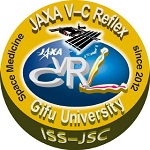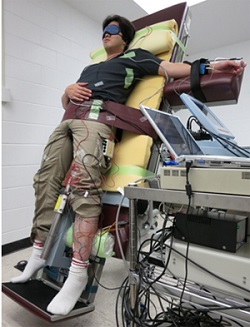This is an archive of information released in the past.
Disclaimer: It may contain broken links or outdated information. Some parts may not function in current web browsers.
*Visit https://humans-in-space.jaxa.jp/en/ for the latest information.

Experiment
- News
- Kibo Utilization Strategy
- Kibo Utilization Plan
- List of JAXA's Utilization Themes
- Experiment Facilities
- Space Environment Utilization
- Archive
Plastic alteration of vestibulo-cardiovascular reflex and its countermeasure (V-C Reflex)

Principal Investigator (PI)
Hironobu Morita
Professor, Department of Physiology, Gifu University Graduate School of Medicine
Background
The vestibular system is located in the inner ear where it senses spatial direction and gravity. The system plays an important role in controlling blood pressure level when we stand up. However, as it is known that the external environment affects this vestibular system function, the space environment with varying levels of gravity could also alter the function of controlling blood pressure.
Purpose
After spaceflight, 40% of astronauts experience dizziness when standing on their feet (orthostatic hypotension). The purpose of this experiment is to test whether the cause of post-flight orthostatic hypotension is affected by reduced vestibulo-cardiovascular reflex.
Description

An orthostatic test at up to 60° is conducted while blood pressure, electrocardiogram, and lower leg volume (benchmarks for shifts in body fluid when standing up) are monitored.
The test is conducted under each of the following three conditions:
- No application of Galvanic Vestibular Stimulation (GVS*)
- Strong application of GVS
- Weak application of GVS
*GVS: To stimulate the vestibular system in the inner ear via specific electric messages. In this experiment, GVS is used to block vestibulo-cardiovascular reflex in humans from gravity information.
As vestibulo-cardiovascular reflex controls orthostatic blood pressure, the blood pressure level is expected to drop when strong GVS is applied (thereby blocking vestibulo-cardiovascular reflex), while orthostatic blood pressure should be maintained when no GVS is applied.
Should vestibulo-cardiovascular reflex be lost during spaceflight, however, blood pressure should drop when one stands up, regardless of GVS application.
The data is taken four times --one to three months prior to flight, within three days, two weeks (±4 days), and two months (±0.5 month) after the return-- to see how vestibulo-cardiovascular reflex changes due to spaceflight and recovers after the return. There is no in-orbit operation.
This is the Point!
Orthostatic hypotension, dizziness, and even falling when one stands up are common symptoms experienced by astronauts immediately after their return and by elderly subjects, thereby suggesting reduced vestibular system function as a common cause.
| Copyright 2007 Japan Aerospace Exploration Agency | Site Policy |